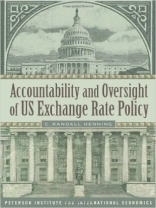The dispute over Chinese exchange rate policy within the United States has generated a series of legislative proposals to restrict the discretion of the US Treasury Department in determining currency manipulation and to reform the department’s accountability to the Congress. This study reviews the Treasury’s reports to the Congress on exchange rate policy—introduced by the 1988 trade act—and Congress’s treatment of them. It finds that the accountability process has often not worked well in practice: The coverage of the reports has sometimes been incomplete and not provided a sufficient basis for congressional oversight. Nor has Congress always performed its own role well, holding hearings on less than half of the reports and overlooking important substantive issues. Several recommendations can improve guidance to the Treasury, standards for assessment, and congressional oversight. These include (1) refining the criteria used to determine currency manipulation and writing them into law; (2) explicitly harnessing US decisions on manipulation to the IMF’s rules on exchange rates; (3) clarifying the general objectives of US exchange rate policy; (4) reaffirming the mandate to seek international macroeconomic and currency cooperation; and (5) institutionalizing multicommittee oversight of exchange rate policy by Congress. As they develop legislation targeting manipulation, furthermore, legislators should not lose sight of the broader purposes of the 1988 act relating to the effective valuation of the dollar, the current account, and their ramifications for the US economy overall.
عن المؤلف
C. Randall Henning was a Visiting Fellow who has been associated with the Institute since 1986. He serves on the faculty of the School of International Service, American University. He specializes in the politics and institutions of international economic relations, international and comparative political economy, and regional integration. His research work focuses on international monetary policy, European monetary integration, macroeconomic policy coordination, finance G-7 and G-8 summit cooperation, and regional cooperation in East Asia.












